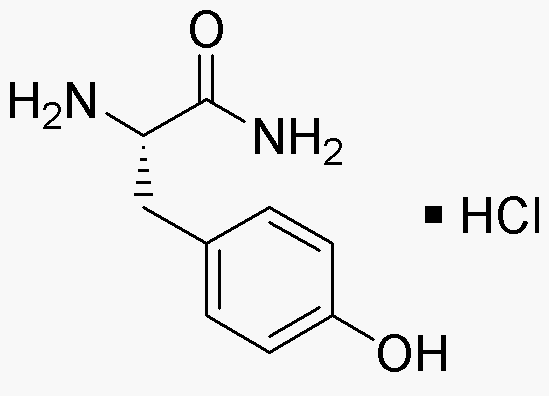L-Tyrosine amide hydrochloride is widely utilized in research focused on:
- Neuroscience: It serves as a precursor for neurotransmitters like dopamine, making it valuable in studies related to mood disorders and cognitive function.
- Pharmaceuticals: This compound is explored for its potential in developing treatments for conditions such as depression and anxiety, providing a natural alternative to synthetic drugs.
- Nutrition: It is used in dietary supplements aimed at enhancing mental performance and reducing stress, appealing to health-conscious consumers.
- Biochemistry: Researchers utilize it in enzyme studies due to its role in protein synthesis, aiding in the understanding of metabolic pathways.
- Cosmetics: The compound is incorporated into skincare products for its antioxidant properties, helping to improve skin health and appearance.
General Information
Properties
Safety and Regulations
Applications
L-Tyrosine amide hydrochloride is widely utilized in research focused on:
- Neuroscience: It serves as a precursor for neurotransmitters like dopamine, making it valuable in studies related to mood disorders and cognitive function.
- Pharmaceuticals: This compound is explored for its potential in developing treatments for conditions such as depression and anxiety, providing a natural alternative to synthetic drugs.
- Nutrition: It is used in dietary supplements aimed at enhancing mental performance and reducing stress, appealing to health-conscious consumers.
- Biochemistry: Researchers utilize it in enzyme studies due to its role in protein synthesis, aiding in the understanding of metabolic pathways.
- Cosmetics: The compound is incorporated into skincare products for its antioxidant properties, helping to improve skin health and appearance.
Documents
Safety Data Sheets (SDS)
The SDS provides comprehensive safety information on handling, storage, and disposal of the product.
Product Specification (PS)
The PS provides a comprehensive breakdown of the product’s properties, including chemical composition, physical state, purity, and storage requirements. It also details acceptable quality ranges and the product's intended applications.
Certificates of Analysis (COA)
Search for Certificates of Analysis (COA) by entering the products Lot Number. Lot and Batch Numbers can be found on a product’s label following the words ‘Lot’ or ‘Batch’.
*Catalog Number
*Lot Number
Certificates Of Origin (COO)
This COO confirms the country where the product was manufactured, and also details the materials and components used in it and whether it is derived from natural, synthetic, or other specific sources. This certificate may be required for customs, trade, and regulatory compliance.
*Catalog Number
*Lot Number
Safety Data Sheets (SDS)
The SDS provides comprehensive safety information on handling, storage, and disposal of the product.
DownloadProduct Specification (PS)
The PS provides a comprehensive breakdown of the product’s properties, including chemical composition, physical state, purity, and storage requirements. It also details acceptable quality ranges and the product's intended applications.
DownloadCertificates of Analysis (COA)
Search for Certificates of Analysis (COA) by entering the products Lot Number. Lot and Batch Numbers can be found on a product’s label following the words ‘Lot’ or ‘Batch’.
*Catalog Number
*Lot Number
Certificates Of Origin (COO)
This COO confirms the country where the product was manufactured, and also details the materials and components used in it and whether it is derived from natural, synthetic, or other specific sources. This certificate may be required for customs, trade, and regulatory compliance.


